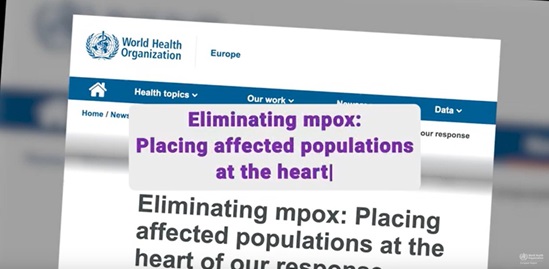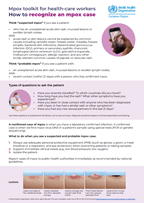Mpox
Mpox is caused by the monkeypox virus and is a member of the Orthopoxvirus genus in the family Poxviridae, which includes variola, cowpox, vaccinia and other viruses.
Mpox was first identified in 1958 in Denmark, when an outbreak of a pox-like disease broke out in a colony of macaques being kept for research. The first human case was reported in 1970. Until recently, most infection in humans were “spillover” infections from animal reservoirs, most likely several rodent and primate species.
However, several strains of mpox now circulate sustainably in human populations in areas of sub-Saharan Africa, and in certain high-risk groups in many parts of the world.
There are 2 distinct clades of the virus: clade I (with subclades Ia and Ib) and clade II (with subclades IIa and IIb).
A global outbreak of clade IIb began in 2022 and this clade is now endemic in many parts of the world, especially among men who have sex with men (MSM). Since 2024 and the emergence of clades Ia and Ib in the Democratic Republic of the Congo, there have been several importations of clade I in the WHO European Region, initially causing small, self-limiting outbreaks within households, but now clade Ib is likely to have established itself among the MSM community.
Normally, mpox is not easily transmitted between people as it requires very close physical contact to allow the virus to be able to enter the body.
The disease is usually self-limiting, with most of those infected recovering within a few weeks without the need for treatment. However, the disease can be more severe, especially in young children, pregnant women and individuals who are immunocompromized.
There are vaccines for mpox, and vaccination should be considered along with other public health interventions.
On 15 August 2024, Sweden became the first country outside the African continent to confirm mpox clade Ib in an individual with travel history to central Africa. The confirmation of the case came just 1 day after the WHO Director-General declared mpox a public health emergency of international concern (PHEIC) for the second time in 2 years, following an upsurge in new and concerning cases in the Democratic Republic of the Congo and several neighbouring countries, including the emergence of a new strain – called clade Ib – which appears to be more severe than clade IIb, which has been circulating in the WHO European Region for some time.
This imported case came more than 2 years after an atypical outbreak of mpox was declared in the Region in May 2022, following reports of a number of cases across several Member States not linked to countries where the disease is endemic.
The outbreak widened globally, prompting the IHR (International Health Regulations) Emergency Committee on mpox to recommend that WHO declare it a PHEIC for the first time, in July 2022.
Less than a year later, in May 2023, noting significant progress made in controlling the outbreak globally, including in the Region, the IHR Emergency Committee recommended that the PHEIC status be removed; the WHO Director-General accepted that recommendation, warning, however, that complacency was dangerous, and urging governments, health authorities and impacted communities to remain vigilant.
In 2024, the first local transmissions of clade Ib in the European Region were confirmed in the United Kingdom.
In 2025, clade Ib infections continued to occur in the European Region. In October 2025, several countries in the Region reported clade Ib infections for the first time. In addition, imported cases of mpox due to clade Ib have been detected among travellers, and 4 countries in the Region have reported clade Ib cases among individuals without travel links, indicating local circulation of the virus in these countries.
In addition to countries in Africa, these countries are now also classified as experiencing community transmission of clade Ib.
Several cases of mpox due to clade Ib have been detected among individuals who self-identify as MSM. These cases provide the first evidence of previously undetected circulation of this virus strain within this at-risk population, in which only clade IIb had been reported since 2022, and across different regions.
In light of expanding community transmission of clade Ib and its detection among MSM, WHO currently assesses the public health risk of mpox of any clade as moderate for MSM and low for the general population in contexts outside historically endemic areas.
However, it is important to note that anyone who has close contact with someone who is infectious can catch mpox, regardless of their sexual orientation.
While anyone can catch mpox, not everyone is at equal risk. People who closely interact with someone who is infectious, including through sexual contact, are at greater risk for infection – particularly sexual partners, but also, potentially, household members and health workers.
It is essential that we remain vigilant to detect and respond to suspected cases. Countries seeing new or increasing cases must also share information quickly, fully and transparently, allowing others to take appropriate actions to halt the spread of mpox.
WHO reiterates that there is no room for stigma and discrimination against individuals and communities impacted by mpox, including within the health-care sector. All governments and health authorities are urged to ensure that infected people and those at high risk are afforded access to care and treatment in an environment underpinned by equity and dignity, in keeping with WHO’s vision of health for all.
Based on our experience with mpox, we know what works. WHO recommends: vaccination for people at high risk of becoming infected with mpox and completion of the vaccination series (i.e. all recommended doses); strong surveillance to identify cases; isolation and treatment of infected cases; contact tracing and close monitoring of contacts; clear risk communication that addresses fear and stigma; and regular sharing of data.













